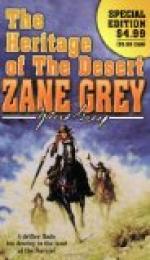Naab’s dogged persistence and the Navajos’ faithfulness carried them into the country of the Moki Indians, a tribe classed as slaves by the proud race of Eschtah. Here they searched the villages and ancient tombs and ruins, but of Mescal there was never a trace.
Hare rode as diligently and searched as indefatigably as August, but he never had any real hope of finding the girl. To hunt for her, however, despite its hopelessness, was a melancholy satisfaction, for never was she out of his mind.
Nor was the month’s hard riding with the Navajos without profit. He made friends with the Indians, and learned to speak many of their words. Then a whole host of desert tricks became part of his accumulating knowledge. In climbing the crags, in looking for water and grass, in loosing Silvermane at night and searching for him at dawn, in marking tracks on hard ground, in all the sight and feeling and smell of desert things he learned much from the Navajos. The whole outward life of the Indian was concerned with the material aspect of Nature—dust, rock, air, wind, smoke, the cedars, the beasts of the desert. These things made up the Indians’ day. The Navajos were worshippers of the physical; the sun was their supreme god. In the mornings when the gray of dawn flushed to rosy red they began their chant to the sun. At sunset the Navajos were watchful and silent with faces westward. The Moki Indians also, Hare observed, had their morning service to the great giver of light. In the gloom of early dawn, before the pink appeared in the east, and all was whitening gray, the Mokis emerged from their little mud and stone huts and sat upon the roofs with blanketed and drooping heads.
One day August Naab showed in few words how significant a factor the sun was in the lives of desert men.
“We’ve got to turn back,” he said to Hare. “The sun’s getting hot and the snow will melt in the mountains. If the Colorado rises too high we can’t cross.”
They were two days in riding back to the encampment. Eschtah received them in dignified silence, expressive of his regret. When their time of departure arrived he accompanied them to the head of the nearest trail, which started down from Saweep Peak, the highest point of Echo Cliffs. It was the Navajos’ outlook over the Painted Desert.
“Mescal is there,” said August Naab. “She’s there with the slave Eschtah gave her. He leads Mescal. Who can follow him there?”
The old chieftain reined in his horse, beside the time-hollowed trail, and the same hand that waved his white friend downward swept up in slow stately gesture toward the illimitable expanse. It was a warrior’s salute to an unconquered world. Hare saw in his falcon eyes the still gleam, the brooding fire, the mystical passion that haunted the eyes of Mescal.
“The slave without a tongue is a wolf. He scents the trails and the waters. Eschtah’s eyes have grown old watching here, but he has seen no Indian who could follow Mescal’s slave. Eschtah will lie there, but no Indian will know the path to the place of his sleep. Mescal’s trail is lost in the sand. No man may find it. Eschtah’s words are wisdom. Look!”




